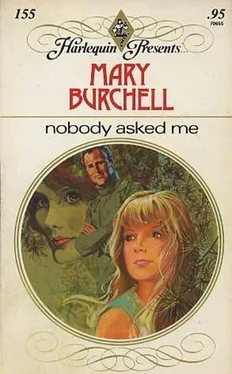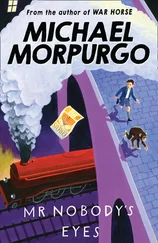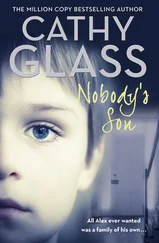
Mary Burchell
Nobody Asked Me
ALISON EARLSTON lifted her suitcase down from the rack as the train drew into the clattering gloom of King’s Cross Station.
In one way, she was glad the journey was over, but she knew that the little shivers which were running down her spine now had nothing to do with the cold wind blowing in through the open window. They were just common or garden funk. She couldn’t disguise it from herself.
‘Leaving school represents a very serious step forward in your lives,’ Miss Graham had assured her fifteen senior scholars in a more-than-usually-solemn address the previous evening. ‘Probably much more serious than you yourselves realise at the moment.’
Fourteen scholars had wriggled a little, and privately thought it a rather stupid comment on the good times they intended to have. But the fifteenth-Alison-had stared at Miss Graham with her big brown eyes and thought without any conscious disrespect, ‘I bet I know a good deal more about the seriousness of my leaving than you ever will.’
For one could not imagine that Miss Graham-with her dignity and her authority-had ever known what it was to be a Poor Relation. And that, Alison knew, was her own unenviable position.
Not, of course, that anyone had ever used the expression in her hearing. In fact, anyone like Miss Graham was at considerable pains to throw a cloak of dignified geniality over the situation. But that didn’t deceive Alison. She had known once what it was to be loved and welcome, and she had no illusions now about the difference.
It didn’t do to think too much of that difference- although it was almost impossible to do otherwise just now, with the busy station scene bringing back the memory of so many homecomings. Mother smiling and eager, scanning each carriage with bright, enquiring eyes, until her ‘Alison darling!’ seemed to mark the real beginning of the holidays.
And Daddy, too-tall, much graver, but thrillingly attractive even to daughterly eyes-ready to greet her with the warm hug and kiss which told her how glad they were to have her home again.
Such dear familiar scenes, so reassuring in their constant repetition. Alison had always thought of them as going on for ever-or, at any rate, until the end of her schooldays, which seemed sufficiently like ‘for ever’ not to matter.
And then, just before her seventeenth birthday, tragedy had smashed its way into her life. Her parents had both been killed in a motor accident, and, when the first clouds of bewilderment had cleared, she had found that not only was she an orphan; she was an orphan without a peony to her name.
It seemed impossible that anyone so grave and responsible-looking as her father could have been an inveterate Stock Exchange gambler. But the state of his finances at his death, the gravity of the family lawyer, and the cool condemnation of Aunt Lydia, all went to support the inevitable conclusion.
He had gambled, recklessly. And, unfortunately, his death had come at a time when his fortunes were at their lowest ebb.
‘Criminal, of course,’ Aunt Lydia had said coldly, though without any real show of emotion. ‘But there is no satisfaction in reviling dead people. They can’t even answer one back.’
It was nearly three years now since she had summed up the situation thus, but, to the bewildered and grief-stricken Alison, those sentences had also summed up her aunt.
Until then Aunt Lydia had been something of an intriguing legend in her mind-something quite fabulously beautiful and quite fabulously rich.
Her first husband and Alison’s mother had been brother and sister, but he had died before Alison was born. She had often heard her mother describe how Aunt Lydia had come home to his family-an exquisitely lovely young widow with an exquisitely lovely little daughter, Rosalie.
‘She really was the most beautiful thing I ever saw Alison,’ her mother used to say. ‘Small and lightly built, with delicate features, red-gold hair, and violet eyes. Real violet; the kind you read about and never see.’
‘And did she look like a princess?’ Alison would prompt her with childish curiosity.
‘Well, yes, she did. I looked desperately ordinary beside her,’ Mother would confess ruefully. ‘And when you came along you looked a very ordinary brown-eyed poppet beside Rosalie.’
Alison never minded that, because it was all right being ordinary if Mother was ordinary too, and she liked to hear about her only relations, who sounded just like people out of a story-book.
Of course it had been inevitable that Aunt Lydia, with her red-gold hair and her violet eyes, should marry again. And she had. She’d married money-lots of it-when Alison was still a baby. The money was attached to someone called Theodore Leadburn. But, although Mother never actually put it into words, Alison always gathered that Uncle Theodore was of quite minor importance beside the money.
After that, it seemed, the meetings between Mother and Aunt Lydia became rapidly fewer. It was one thing to accept a home from her husband’s people when she was a penniless widow. It was quite a different matter to bother to keep up a connection with them when she had made a wealthy marriage.
There was never any actual break between them-nothing at all unpleasant-but Aunt Lydia was busy scaling golden heights, while Mother was busy being a perfectly ordinary person.
True, every Christmas Alison used to receive a very expensive-looking card, inscribed, ‘To dear Alison, with love from Cousin Rosalie,’ and she used to send back a not-so-expensive-looking card, inscribed, ‘To dear Rosalie, with love from Cousin Alison.’ But except for this annual outburst of affection, and an occasional letter from Aunt Lydia -on the Riviera or in Scotland or on a cruise-there was no communication between the families.
Once, when Alison was about nine, there had been a different sort of card-very beautifully printed and impressive-looking-to state the rather astounding fact that Aunt Lydia had had two more children at one and the same time -a girl and a boy.
Alison thought it was exciting. But Daddy said, ‘Good God, that was a bad slip,’ and Mother said, ‘Hush, dear. Not in front of Alison.’ Which, of course, had fixed it in Alison’s memory.
But not long after that even the letters and the Christmas cards had ceased, and Alison scarcely even thought about the existence of her rich but shadowy relations… Until the awful day when she realised that, but for them, she was utterly alone in the world.
Aunt Lydia -looking thirty, although Alison knew she must be about forty-two-came down to the school to interview her niece and Miss Graham.
Even in her grief and misery Alison felt some curiosity at the legendary Aunt Lydia appearing at last. It took only a minute to see that her mother had not exaggerated the description of her aunt’s beauty. And, as she looked into the cold loveliness of those violet eyes, Alison dimly sensed the meaning of her father’s remark about the arrival of the twins, years ago. There was nothing sympathetic or motherly about Aunt Lydia.
For all her fragile loveliness she was a woman of great decision, and she seemed to have Alison’s unfortunate situation at her admirably manicured finger-tips.
‘There’s not a penny, my dear, and we may as well face the fact,’ she assured the wincing Alison. ‘I don’t know what your parents intended you to do-?’ She paused for a moment to allow her niece to fill in an awkward gap.
‘I was to stay at school until I was eighteen,’ muttered Alison.
Читать дальше













